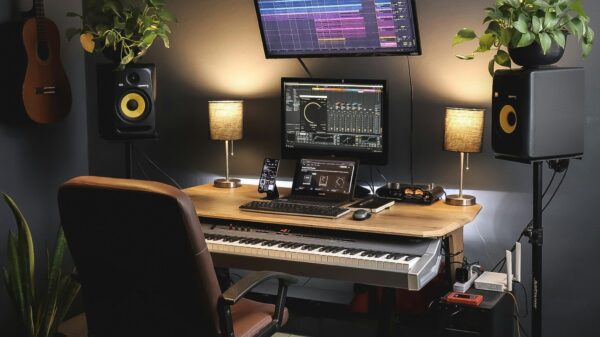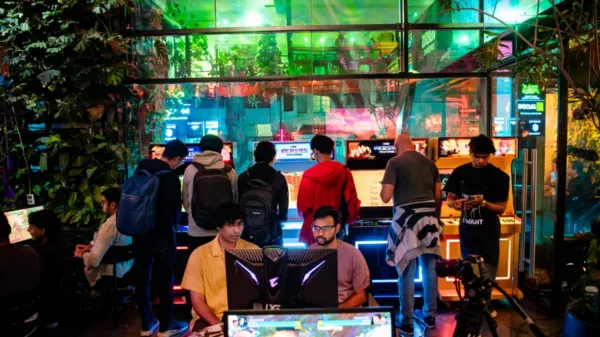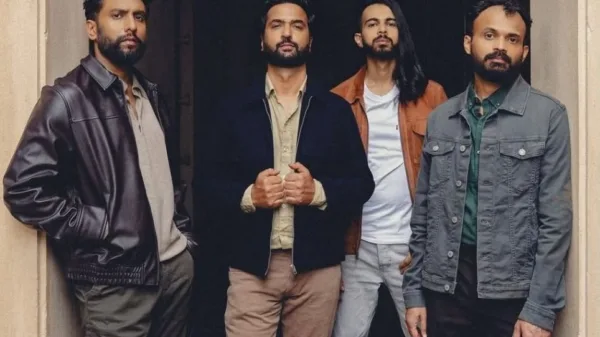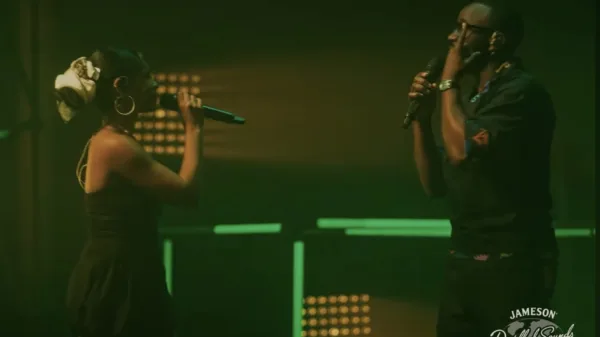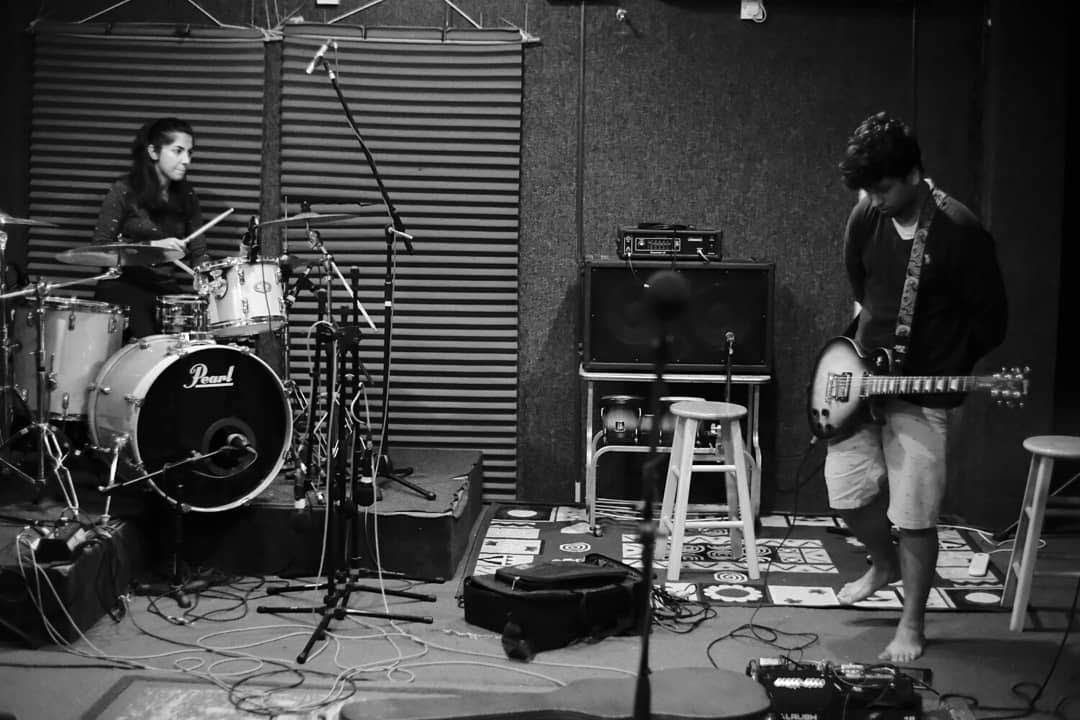Exquisite rhythms, mellifluous tones and a beautiful interweaving of styles and genre. These are some of the things that come to mind while listening to “Sounds like Treble”, the debut album of Bangalore-based Electronica duo Treble Puns. Their 4-track instrumental album explores a musical world influenced by elements of progressive rock, electronica and indian classical music.
We spoke to the band about their proclivity to the usage of puns, their music writing process and their attempt to narrate a story through their album. Read the entire interview below.
1. Tell us about your duo. How did you meet?
A little over a year ago, both of us were featured on a musicians platform called ‘Instrupad’. Roy was looking for a percussionist to go with his guitar looping techniques and I was looking for a composer, who was equally interested in instrumental music. I reached out to Roy and we figured we stayed close by. So, we immediately decided to jam the next day and it turned out to be an epic jam, with a sound that we both always envisioned to work with. That was how Treble Puns started. 🙂
Abhimanyu Roy (Guitars/Keyboard/Programming): Roy has been playing the guitar for over 20 years now, with a style influenced heavily by blues, Indian classical and metal. What he really needs now, is more hands. At any time, Roy can be seen on stage juggling his guitars, keyboards, loopers and other gadgets.
Sohini Bhattacharya (Drums/Percussion): The groove machine of the band, Sohini brings with her a rich experience of playing in a number of Bangalore bands as well as a Samba percussion group in Germany. Having played the drums for over 9 years, Sohini lays a solid technical foundation for the band with her post rock/hip-hop laced rhythms.
2. Which bands or artists have had the biggest influence on you?
Our sound is an homage to the artists that inspire us. We tend to think like a Prog Rock band, breaking rhythms down into unequal patterns as is wont of Tool and Porcupine Tree. The melodies are Indian, drawing greatly from Ragas. Personally very inspired by great Indian guitar players like Pandit Vishwa Mohan Bhatt, Biju Dharamarajan, Sushmit Sen and Rex Vijayan. Our overall sound aesthetic borrows from Electronica with ambient keyboard loops replacing rhythm guitars, akin Tame Impala or Daft Punk even.

Samiksha Nair and Zenobia Jhaveri
3. You released your debut EP called “Sounds Like Treble”. Tell us a bit about it.
The point of this album was to create a sound that’s extremely relatable. We wanted to tell a story with this album but knew it would be challenging to create a narrative in an album without vocals, so we employed two storytelling tools –
A. Commonly heard brickbats, which we have all heard through our formative years, from the mouths of our disapproving moral and societal guardians, included as colloquial spoken word in each song.
B. A series of animations that show how our protagonist transitions from docility to indifference.
4. What’s your music making and recording process like?
In our many discussions around how we should approach writing this album, 2 things were sacrosanct: sound and relatability.
First up, sound. We’re both obsessed about sound and therefore started working composition backwards on this album. The bass and keys came first for all songs with a lot of experimentation happening with sounds, most of which were written on an ipad and a looper (with the exception of “Na Mask Aram” which was based on an old riff we’d been playing around with for a while). This was followed by studio sessions for drums and guitars which was an incredible experience for us both to listen to ourselves at such a high end sound quality output. We were lucky to be guided by Thejus from elevengauge recordings throughout this process. Thejus is an incredible sound engineer who came highly recommended by many of our friends in music and he more than lived up to his reputation.
Relatability kept rearing it’s head all through this process. The first step towards this was getting the album to sound Indian, but not feel Indian. We paired shankhs and sitar tones, alaps and Tanpura drones with progressive bass lines and uneven time signatures to try and do that job.
We wanted to tell a story with the album and were left limited by the middleclassness of our lived experiences. So the story we told was a middle class one of constant instruction screamed at us through parents and teachers and tyrannical newsreaders. All vocals in this album were contributed by friends and family. None of the vocals heard on this album were scripted: we just asked for vocal samples of stuff they’ve grown up hearing.
5. Your pun game seems strong. How do you name your songs? And Tell us what your songs are about?
The themes were set for each song (Teacher, Father, Newsreader and Mother). We were looking for better ways to explain relationships in these songs + puns through which to say them.
The songs are based on our relationships with people. Not love and other inventions of greeting card companies, but the friction that makes these relations real. “No Teacher’s Pet” talks about our obsession with formal education and it’s commoditization as a means to wealth. “Father of the Notion” deals with a father trying to pass the buck of responsibility to his ward. “Na Mask Aram” begins with a newsreader, as do most of our decisions and actions in real life. “Momologue”, our longest piece features the oft used parenting technique of shaming one’s child into righteouness.

6. One Indian independent artist that you would want to collaborate with?
Sitar Metal/Rishabh Seen: This is one band in recent times that has really caught our attention. We love their work ethic, sound design and they seem to be in the same space of combining Rock and Indian Classical. So it just seems like a natural fit.
We’d also love to collaborate with a rappers like Emiway, Bantai, Divine or Naezy. That would be a very interesting collaboration for us.
7. What is your favorite memory of making this record?
The studio experience was definitely one of them. It was new to us, as we have for the most part of our time together as a band been jamming. So to sit and play one thing perfectly was both a luxury as well as a confusing feeling. This was definitely a huge learning curve of finesse for us. Also, everytime our Sound Engineer Thejus would send us versions of the mixes of our songs, we would be so mind blown to listen to our own music in such good quality! Since this is our debut album, the whole experience of creating it will be one to cherish forever.














